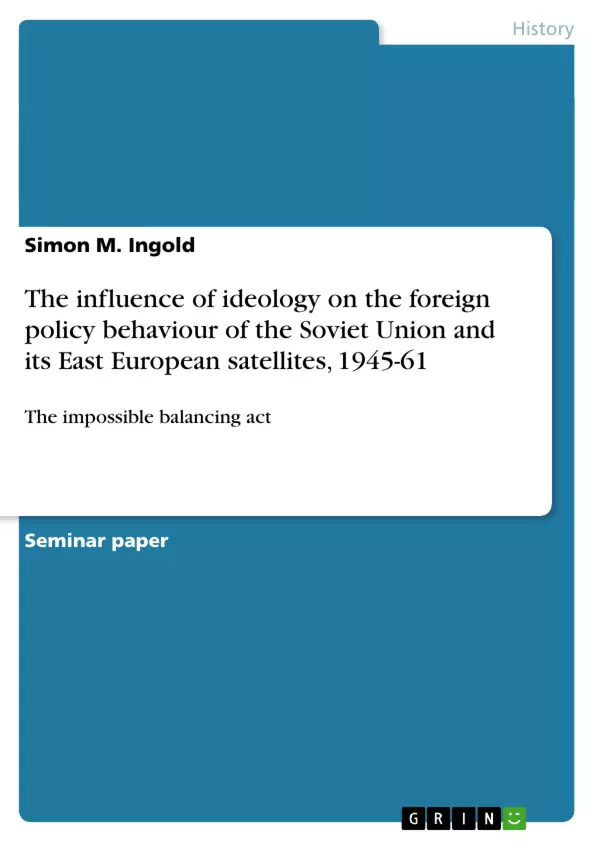In order to evaluate the influence of ideology on the foreign policy behaviour of the Soviet Union and its satellites during the phase of 1945-61, I will start with an overview of the specific functions that Marxist-Leninist ideology fulfilled in the context of Soviet foreign policy. This is critical for the understanding of the practical uses of ideology in the policy making process and for the Soviet cause as a whole. In a second step, I will set forth the role of ideology and its different functions during the Stalinist era (1945-53) and up to the building of the Berlin wall in 1961. Special emphasis will be laid on changes in the use of ideology as a foreign policy tool and their respective causes. This analysis is followed by an assessment of the implications on the responsibility for the Cold War in Europe.
Inhaltsverzeichnis (Table of Contents)
- Introduction
- The functions of ideology in Soviet foreign policy behaviour
- Ideology 1945-1953: Stalin, Tito, and the quest for balance
- Ideology 1953-1961: Khrushchev, Ulbricht, and the loss of homogeneity
- Implications regarding the responsibility for the Cold War in Europe
Zielsetzung und Themenschwerpunkte (Objectives and Key Themes)
This paper examines the influence of Marxist-Leninist ideology on the foreign policy of the Soviet Union and its Eastern European satellites during the period of 1945 to 1961. It explores the various functions of ideology in the context of Soviet foreign policy and analyzes the impact of ideological shifts on the development of the Cold War.
- The functions of ideology in Soviet foreign policy behaviour
- The role of ideology in the Stalinist era (1945-1953)
- The impact of ideological changes in the Khrushchev era (1953-1961)
- The relationship between ideology and the Cold War in Europe
- The balancing act between ideological consistency and political pragmatism
Zusammenfassung der Kapitel (Chapter Summaries)
- Introduction: This chapter introduces the topic of the paper and provides an overview of the influence of Marxist-Leninist ideology on the Soviet Union and its satellites. It also outlines the main questions and arguments to be explored.
- The functions of ideology in Soviet foreign policy behaviour: This chapter delves into the practical functions of Marxism-Leninism in Soviet foreign policy. It discusses how ideology served as a means of creating unity within the communist bloc, a tool for propaganda, a source of prestige for communist leaders, and a method for differentiating from the enemy.
- Ideology 1945-1953: Stalin, Tito, and the quest for balance: This chapter examines the use of ideology during the Stalinist era. It analyzes the challenges Stalin faced in balancing ideological principles with political realities and explores the impact of his policies on the relationship between the Soviet Union and its satellites.
Schlüsselwörter (Keywords)
The key themes and concepts explored in this paper include Marxist-Leninist ideology, Soviet foreign policy, Eastern European satellites, Cold War, propaganda, prestige, differentiation, Stalin, Khrushchev, Tito, Ulbricht, and the quest for ideological homogeneity.
- Quote paper
- M.A. Simon M. Ingold (Author), 2005, The influence of ideology on the foreign policy behaviour of the Soviet Union and its East European satellites, 1945-61, Munich, GRIN Verlag, https://www.hausarbeiten.de/document/83097


